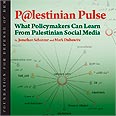
Palestinian Pulse studies Net trends
Internet study finds worrying Palestinian trends
Research hoping to affect US policy-makers finds Palestinians unlikely to challenge Iran, seek reform
WASHINGTON – New and unprecedented research published Tuesday says the US administration has failed to recognize a proliferating trend of peace rejection among Palestinians.
"Palestinian Pulse", conducted by Jonathan Schanzer and Mark Dubowitz, tracked Palestinian internet resources, many of which originated from the West Bank and Gaza, on subjects related to the peace process, coming up with mainly negative approaches.
Schanzer and Dubowitz are senior officials at the Washington-based Foundation for Defense of Democracies, which was established with the aim of providing policy-makers with new tools to study social media.
The study tracked debates on a number of social networking sites, including Facebook, Twitter, YouTube, and several blogs, using a method that has never before been used.
Rather than publishing surveys and polls, Schanzer and Dubowitz used software designed by ConStrat, originally for military use, to compile information relevant to their research.
In the space of two months, the study says, "ConStrat viewed approximately 10,000 Palestinian social media entries and analyzed approximately 20 percent of them for relevancy. In the end, the company analyzed 1,788 statements contained within 1,114 unique posts across 996 threads written by 699 authors."
The researchers claim that this tracking gave them a relatively clear picture of key trends in Palestinian society. "FDD undertook this project with the assumption that online social networks provide important political insights—particularly in the Palestinian online environment—because they grant their users anonymity and freedom of expression," they write.
The study boasts a number of conclusions. First, "Hamas shows little desire for a negotiated peace with Israel. On this issue, the faction’s supporters showed no apparent disagreement with Salafists such as al-Qaeda," it says.
Regarding Fatah, trends are divided. "Its supporters break down into two factions of roughly equal strength: one that supports non-violence, and one that seeks armed conflict and terrorism against Israel," the study concludes.
It also bodes ill regarding Iran's proliferating effect on Palestinian society. "There is little evidence that Palestinians are prepared to challenge Iran’s vast influence in the Gaza Strip, where it is prevalent, or in the West Bank, where its influence is less clear," the researchers conclude.
"Palestinian reform factions are weak and have little influence online, raising red flags about institution building and/or liberalization."
Schanzer and Dubowitz's main point is that internet trends can provide policy-makers with a much clearer picture than that afforded by surveys and polls. Both have published a number of texts on the Arab and Palestinian world.
- Follow Ynetnews on Facebook










